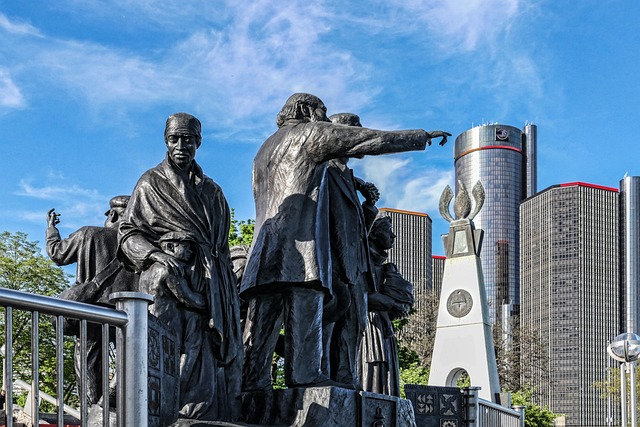The heartbeat of Detroit is its people. Throughout the city’s history, grassroots movements have played a pivotal role in shaping its landscape. Today, Detroit’s local activism is more vibrant than ever, responding to issues like housing inequality, environmental justice, and economic development. One of the most prominent examples is the Detroit Black Community Food Security Network (DBCFSN). Founded by Malik Yakini, this organization has been at the forefront of promoting food sovereignty in the city. DBCFSN operates the D-Town Farm, a seven-acre urban farm that produces fresh, local food and educates the community on sustainable agriculture practices. Their work highlights the growing trend of food justice activism in Detroit, where residents are taking control of their food systems to ensure access to healthy, affordable options.
Another key player in Detroit’s grassroots scene is the People’s Water Board Coalition (PWBC). This group has been fiercely advocating for water rights since the Detroit water shutoffs in 2014, which affected thousands of residents. PWBC has brought national attention to the issue of water affordability and the human right to water, making it a central concern in local politics. The coalition’s efforts have pressured city officials to reconsider policies and work toward more equitable water access solutions. These movements exemplify how grassroots activism in Detroit isn’t just about protests; it’s about creating tangible change through community-driven initiatives.
The Impact of Local Activism on the Political Landscape
Detroit’s grassroots movements aren’t just influencing social issues; they’re also reshaping the city’s political landscape. The rise of local activism has led to a new wave of political engagement, with activists running for office and community organizations pushing for policy changes. A prime example is Rashida Tlaib, a Detroit native and former state representative who became one of the first Muslim women elected to Congress in 2018. Tlaib’s political career was heavily influenced by her work as a community organizer in Detroit, where she fought for environmental justice and against corporate polluters in her neighborhood. Her election to Congress was a significant victory for grassroots movements, demonstrating the power of local activism to propel leaders into positions of national influence.
Moreover, the Detroit Action group has been instrumental in mobilizing voters and advocating for progressive policies. This organization focuses on issues like economic justice, housing rights, and police reform, and has been a key player in local elections. In the 2022 midterms, Detroit Action helped increase voter turnout in the city’s marginalized communities, contributing to the election of candidates who support their mission. Their success underscores the growing influence of grassroots organizations in shaping Detroit’s political future. The intertwining of activism and politics in Detroit reflects a broader trend across the U.S., where local movements are increasingly driving change from the ground up.
Challenges and Opportunities for Grassroots Movements in Detroit
While Detroit’s grassroots movements have achieved significant victories, they also face numerous challenges. One of the biggest obstacles is funding. Many grassroots organizations rely on donations and grants to sustain their operations, but securing consistent funding can be difficult. This financial strain often limits their ability to expand and reach more residents. Additionally, grassroots movements in Detroit must navigate a complex political environment, where policies and regulations can either support or hinder their efforts. For instance, zoning laws and land use regulations have been a major hurdle for urban farming initiatives like D-Town Farm. Advocates have had to push for changes in local ordinances to allow for more community gardens and urban agriculture projects.
Despite these challenges, there are also significant opportunities for growth. The increasing focus on sustainability and social equity in urban planning provides a fertile ground for grassroots initiatives. As more Detroiters become involved in local activism, there is a growing sense of community empowerment. This collective energy is driving innovative solutions to some of the city’s most pressing problems. For example, the Detroit Community Wealth Fund (DCWF) offers financial support to cooperative businesses owned by residents, promoting economic self-sufficiency and reducing reliance on external corporations. By fostering local entrepreneurship, DCWF is helping to build a more resilient and equitable economy in Detroit.
Key Achievements
Detroit’s grassroots movements have made remarkable strides across various sectors, highlighting their effectiveness in driving change at the local level. These achievements serve as a testament to the power of community-led initiatives in transforming the city’s social and political landscape. Here are some of the key accomplishments:
- Food Sovereignty and Urban Agriculture: The Detroit Black Community Food Security Network has successfully established the D-Town Farm, which not only provides fresh produce to local residents but also educates the community on sustainable farming practices.
- Water Rights Advocacy: The People’s Water Board Coalition has played a pivotal role in raising awareness about water affordability and access, influencing policy discussions and pushing for more equitable solutions in Detroit.
- Voter Mobilization: Detroit Action’s efforts in increasing voter turnout, particularly among marginalized communities, have led to the election of progressive candidates who align with the organization’s mission of economic and social justice.
These accomplishments underscore the significant impact that grassroots movements can have on improving the quality of life in Detroit, fostering a more equitable and inclusive community.

